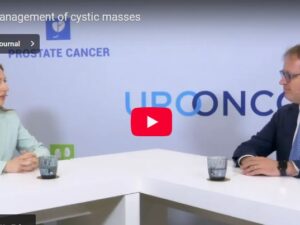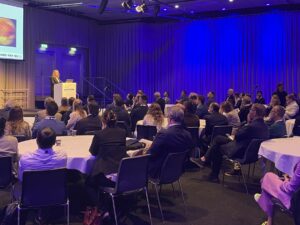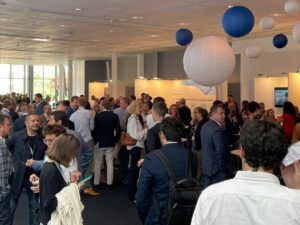In this article, UROonco25 steering committee member and EAU Section of Oncological Urology Chair Prof. Alessandro Volpe (IT), as well as Dr. Gianluca Giannarini (IT), Dr. Maria Carmen Mir Maresma (ES) and Assoc. Prof. Jonathan Aning (GB) share their insights into the key onco-urology topics to be explored during this year’s UROonco25 scientific programme.
Diagnostic advances, biomarkers and evolving therapies in RCC
Insights from Prof. Volpe: “Interesting new data have emerged in the field of diagnosis and treatment of localised and advanced RCC in the last few months and this will take centre stage during the renal sessions.”
Among the key highlights is the use of radiolabelled 89Zr-DFO-girentuximab, which has attracted significant attention. This monoclonal antibody targets carbonic anhydrase IX (CAIX), an enzyme highly expressed in clear cell RCC (ccRCC) and can help differentiate between clear cell histology and other renal lesions. “Data from the ZIRCON study published on The Lancet Oncology confirms that this imaging technique is well tolerated and can accurately and non-invasively identify ccRCC with promising utility for decision making in patients with indeterminate small renal masses,” Prof. Volpe noted.
In post-nephrectomy follow-up, traditional surveillance strategies may miss early signs of recurrence. New biomarker research, the AURORAX-0087A trial, has shown that glycosaminoglycans (GAGs) collected from blood and urine may offer a highly accurate and less invasive approach. “Trial results showed a 97% negative predictive value, with the potential to reduce the number of unnecessary imaging tests during follow-up, lowering radiation exposure and costs,” Prof. Volpe explained.
On the therapeutic front, while the final results of the COSMIC-313 trial (cabozantinib in combination with nivolumab plus ipilimumab in previously untreated advanced RCC) demonstrated a significant benefit in favour of the addition of triplet (16.6 vs. 11.2 months; HR: 0.82), Prof. Volpe stated “there was no overall survival benefit with median survivals of 41.9 vs. 42 months in the intervention and control arms, respectively (HR: 1.02).”
Commenting on the recent KEYNOTE-564 results, Prof. Volpe noted “data from the trial showed that adjuvant pembrolizumab significantly and clinically meaningfully improved overall survival compared to placebo in patients with ccRCC at intermediate-high risk of recurrence after surgery,” This has led to a strong recommendation for adjuvant treatment in this population in the EAU Guidelines. “Clinical questions are arising regarding the ideal management of progressive disease after adjuvant treatment.”
These topics will be highlighted in lectures and case discussions, together with updates and round tables on the emerging role of stereotactic body radiation therapy (SBRT) in RCC treatment and on surgical management of cystic and multifocal renal tumours.
Practice-changing trials for prostate cancer
Insights from Dr. Giannarini: “Prostate cancer research is more dynamic than ever, with a continuous surge of clinical trials exploring new treatment paradigms. These efforts are driving the evolution of personalised care pathways, paving the way for more effective and tailored therapeutic strategies.”
“This year, special emphasis will be placed on managing complications and challenging scenarios in both localised and advanced cases. Case discussions will explore the clinical impact of PSMA PET imaging in primary and secondary staging. There is also a session focusing on emerging strategies for treatment intensification and de-escalation in metastatic hormone-sensitive prostate cancer (mHSPC), as well as on optimising sequencing and combination therapies in the castration-resistant setting.”
According to Dr. Giannarini, a key highlight will be two dedicated sessions on pivotal clinical trials (ARANOTE, LIBERTAS, and TALAPRO-2, and ENZA-p), where study investigators and leading experts will present the latest updates. “These sessions will feature dynamic, multidisciplinary ‘trials-put-in-practice’ roundtable discussions, ensuring an engaging and insightful exchange of perspectives.”
“2025 promises to be another exciting year for advancements in PCa care,” said Dr. Giannarini. “Practice-changing data have already been (or will soon be) presented at major urological and uro-oncological meetings, prompting updates in international clinical practice guidelines. These developments particularly focus on novel strategies for PCa detection, management of non-metastatic high-risk disease, as well as combination and intensification strategies for advanced disease, both in the hormone-sensitive and castration-resistant stages. Additionally, there is growing anticipation around the earlier application of innovative therapies, such as PSMA-based theranostics.”
Bladder and upper tract urothelial cancer updates
Insights from Dr. Mir Maresma: “The current role of biomarkers in bladder cancer follow-up will be discussed, taking into consideration the recent DaBlaCa 15 trial results presented at the EAU Congress in Madrid, and how these findings might be integrated into clinical practice.”
In the session on muscle-invasive bladder cancer (MIBC), attention will focus on evolving bladder preservation strategies. “We’ll explore how can we start selecting patients to avoid cystectomy in localised MIBC or in locally advanced MIBC with positive lymph nodes.” Dr. Mir Maresma added.
Insights from Assoc. Prof. Aning: “The emerging role of circulating tumour DNA (ctDNA), also referred to as a ‘liquid biopsy’ will be discussed. While it has shown significant promise in clinical trials, ctDNA is not yet routinely used in standard care pathways. Dr. Francesco Soria (IT) will present on the potential of ctDNA across the spectrum of urothelial carcinoma and share his insights on mainstreaming ctDNA.”
“This year’s session on low-risk NMIBC will focus on de-intensification protocols and surveillance strategies. Additionally, Prof. Paolo Gontero (IT) will present on the restructured section in the EAU Guidelines for recurrence during and after intravesical BCG. He will highlight where we stand regarding the management of recurrence after BCG and BCG unresponsive disease, including defining optimal treatment sequences.”
Lastly, there will be a session on upper tract urothelial carcinoma (UTUC) on the potential role of PET-Glu in staging, as well as cytoreductive nephroureterectomy as a viable first-line option in metastatic UTUC.
Rare cancers
Two plenary sessions co-chaired by Dr. Oscar Brouwer (NL) and Prof. Christian Fankhauser (CH) will focus on rare cancers. The first session will cover key challenges in diagnosing testicular cancer, from molecule markers to modern imaging techniques. The second will cover penile-sparing surgery, with surprising findings on functional outcomes and a discussion on ideal follow-up protocols.
—–
Check out the full UROonco25 scientific programme, which includes the latest research and updates from international urological gatherings such as ESMO, ASCO GU, AUA, EAU and ASCO. You can register here to attend UROonco25.





